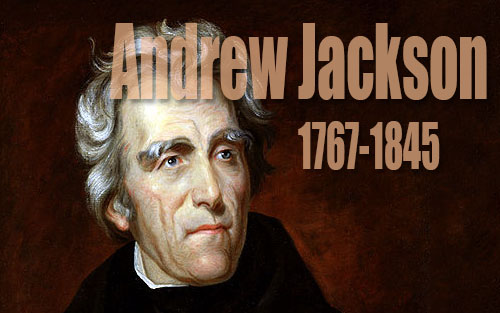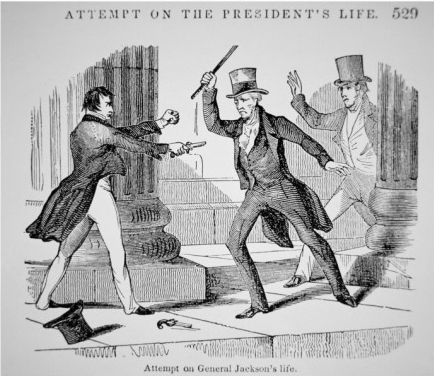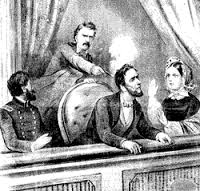Old Hickory, Honest Abe & Camelot
May 11, 2015

martyrs for our Freedom. Clearly our common oppressor
is the central banker operating through his myriad lackeys
and opportunists, i.e. our government and mass media. All wars are
fought to protect the central bankers' fraudulent ownership
of the medium of exchange, i.e. currency. The ultimate goal
of the bankers is Communist tyranny.
In 1828, Andrew Jackson took a run at the US Presidency. Throughout his campaign he railed against the international bankers who controlled the Bank of the United States (BUS.) Jackson ranted, "You are a den of vipers. I intend to expose you and by Eternal God I will rout you out. If the people understood the rank injustices of our money and banking system there would be a revolution before morning."
 Populism prevailed and Jackson was re-elected. In 1835 he was the target of an assassination attempt. The gunman was Richard Lawrence, who confessed that he was, "in touch with the powers in Europe". [9]
Populism prevailed and Jackson was re-elected. In 1835 he was the target of an assassination attempt. The gunman was Richard Lawrence, who confessed that he was, "in touch with the powers in Europe". [9]HONEST ABE
By 1861 the US was $100 million in debt. New President Abraham Lincoln snubbed the Euro-bankers again, issuing Lincoln Greenbacks to pay Union Army bills.
 The 1863 National Banking Act reinstated a private US central bank and Chase's war bonds were issued. Lincoln was re-elected the next year, vowing to repeal the act after he took his January 1865 oaths of office. Before he could act, he was assassinated at the Ford Theatre by John Wilkes Booth. Booth had major connections to the international bankers. His granddaughter wrote This One Mad Act, which details Booth's contact with "mysterious Europeans" just before the Lincoln assassination.
The 1863 National Banking Act reinstated a private US central bank and Chase's war bonds were issued. Lincoln was re-elected the next year, vowing to repeal the act after he took his January 1865 oaths of office. Before he could act, he was assassinated at the Ford Theatre by John Wilkes Booth. Booth had major connections to the international bankers. His granddaughter wrote This One Mad Act, which details Booth's contact with "mysterious Europeans" just before the Lincoln assassination.Nearly a century after Lincoln was assassinated for issuing Greenbacks, President John F. Kennedy found himself in the Eight Families' cross hairs....
The wife of Lee Harvey Oswald, who was conveniently gunned down by Jack Ruby before Ruby himself was murdered, told author A. J. Weberman in 1994, "The answer to the Kennedy assassination is with the Federal Reserve Bank. Don't underestimate that. It's wrong to blame it on Angleton and the CIA per se only. This is only one finger on the same hand. The people who supply the money are above the CIA". [14]
Related- In Defence of Lincoln by Dick Thompson
Was Lincoln a Money Power Puppet? by Anthony Migchels
First Comment by Glen:
Lincoln hated this fiat money. He accepted the third and final issue of these fiat bills, but he sent a letter to Congress in which he expressed his "sincere regret that it has been found necessary to authorize an additional issue of United States notes." He called on Congress to pass his solution, the National Bank Act, which Congress did a month later. This is recorded in the definitive historical book on the Greenbacks, Wesley C. Mitchell's A History of the Greenbacks (1903), page 109. You can download it for free here.
Lincoln promoted the National Bank Acts of 1863 and 1864. Here is a description of this system. It is provided by a specialist organization, Tax Analysts.
Federal taxes were also instrumental in instituting a system of national banking during the war. The National Banking Acts of 1863 and 1864 imposed a system of "free banking" -- banks established by general incorporation as opposed to specific charters -- on a national level. State banks were granted national charters and allowed to issue national bank notes (these notes were separate from Greenbacks). One third of a national bank's capital had to consist of federal bonds, since the new national notes were to be backed by federal bonds. The National Banking Acts thus served as another means to induce bankers to purchase bonds. In an attempt to avoid increased regulation, however, many state banks declined to seek national charters. To remedy this problem, the 1864 act imposed a 10 percent tax on state bank notes to drive them out of existence. As a result of this tax, the number of national banks tripled by the war's end, while their purchase of U.S. bonds nearly quadrupled.
Lincoln did not "foil" the bankers. He made the big ones even richer by creating a more centralized banking system. And why not? He had been a rich lawyer for the Illinois Central Railroad. The Illinois Central funded its operations through the sale of bonds. The entire industry did. Anything that threatened the bankers threatened Lincoln's post-Presidential career.
As economic historian Thomas DiLorenzo points out,
By 1860 Lincoln was the most prominent attorney/lobbyist the railroad industry had. He was so prominent that the New York financier Erastus Corning offered him the job of general counsel of the New York Central Railroad at a salary of $10,000 a year, an incredible sum at the time. Lincoln turned down the offer after agonizing over it.
As soon as he was elected President, he pressured Congress to pass a law for the government to subsidize the westward expansion of the railroads. He specified that the eastern terminus for the Union Pacific Railroad be Council Bluffs, Iowa. Lincoln had bought land in Council Bluffs several years earlier.
To describe the Greenbacks as "Lincoln money" is deceptive, yet Brown and her predecessors -- especially Gertrude Coogan -- have never ceased promoting this myth. (You can read my critique of Coogan here.)
She now calls Lincoln a "reluctant Greenbacker." She still refuses to mention his support of the National Bank Act of 1863.
The reinstatement of the privatized central bank to issue bonds en lieu of currency was an act of Congress in 1863, which Lincoln swore to repeal soon as the war was over, but he was assassinated. Henderson then concluded;
"Following the Lincoln hit, Booth was whisked away by members of a secret society known as Knights of the Golden Circle (KGC). KGC had close ties to the French Society of Seasons, which produced Karl Marx. KGC had fomented much of the tension that caused the Civil War and President Lincoln had specifically targeted the group. Booth was a KGC member and was connected through Confederate Secretary of State Judah Benjamin to the House of Rothschild. Benjamin fled to England after the Civil War.
How could it be any more of 'Rothschild hit' than that?







Al Thompson said (May 12, 2015):
Central banking is a part of the Communist Manifesto. Controlling the currency of a nation is just too muchs power in too few hands.
Currency should be like any other product. It should compete in the market place. But being true to the communist point of view, bankers eliminate competition with their monopoly over finances. To that end, they instigate endless war and profound misery for mankind.
The other part of the problem is the use of usury/interest. Interest has always been considered a form of theft, so that a man who makes any loans is compromising his own future by paying much more for the product than he otherwise would have. The problem in trying to correct such things is the use of political assinations. Anyone who is opposed to the banking system, who gets any kind of political power is a target of the bankers.
In my opinion, central banking and usury should be abolished. They've had plenty of time to exist and they are proven failures. Instead of paying interest, users could pay transaction charges and those charge will be kept in line by competition. Lenders could take a share of a company in exchange for loans. There are ways to solve the problem. Central banking and usury are the two most devastating financial curses known to mankind.
Competition would help to keep the bankers honest(if there is such a thing).
The incentive for bankers is to create as much debt as possible in order to get more interest. It's just a money issue. However, the system as it stands now is completely immoral and extremely evil to the core.
http://verydumbgovernment.blogspot.com/2010/02/scourge-of-usury.html